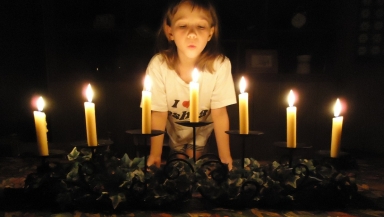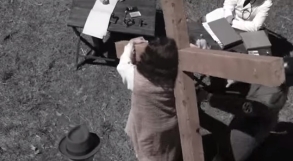
It's become increasingly a feature of Christian worship, especially in Holy Week: a Christian 'seder' or Jewish Passover, which aims to connect Christians with their Jewish roots and even to recreate, as far as possible, the last Passover meal that Jesus shared with his disciples.
For many, it's an intriguing glimpse into part of the Christian tradition which they might not have considered before. They feel it enriches their understanding of their faith and in their minds it honours their Jewish spiritual ancestors. But it's not straightforward. Some Jews feel it's completely inappropriate: Christians are taking something that doesn't belong to them, 'baptising' it and making it their own, with no regard for the people who originated the tradition in the first place. Furthermore, it treats Judaism as a sort of spiritual fossil, failing to appreciate that it's a living and vibrant faith with a rich contemporary spiritual life.
Rabbi Natan Levy, who represents the Board of Deputies of British Jews (BOD) on interfaith issues, told Christian Today that while the BOD conducted 'demonstration' seder services (the Passover ritual) every year for inquirers which were authentic representation of what happens in Jewish homes, he was uncomfortable with the idea of Christian churches simply using the service for their own purposes.
"It can be hard to say when something is an honouring of the historic moment or an appropriation of it," he says. "There's a difference between learning about a separate tradition and appropriating it, saying it's ours – that's wrong."
He does recognise that religious traditions borrow from each other, pointing out that the seder itself was taken from a Roman tradition in which the cup was blessed and shared – though he adds that the Jewish observance "subverted" the Roman by including everyone, rather than just the elite.
The form of words used for the seder is laid down in the Haggadeh text. Levy says to Christians considering exploring the Jewish tradition: "If you are engaging with the Haggadeh, it's a learning process. If not, it's a rewriting.
"I feel uncomfortable about it being used purely as a reference point in an evangelistic context. If you do it, it should be as authentic as possible and it should involve contact with a rabbi or a Jewish person. It should be used as a tool for dialogue."
His concerns are echoed by Christian ministers too. Methodist minister Rev Mark Rowland, team leader at Coventry Central Hall, told Christian Today: "My reservations are twofold. Basically, the Passover is a Jewish celebration and if we just take it over and hold Passovers in Christian churches, we might not really understand what we're doing and then we wouldn't be showing proper respect to something that is not our tradition.
"Also, the Passover as it is now has developed from how it was in Jesus' day – it's not as simple as saying we're doing what Jesus would have done."
He points to the Book of Worship of the United Methodist Church (a separate denomination) which offers guidance saying: "United Methodists are encouraged to celebrate the Seder as invited guests in a Jewish home or in consultation with representatives of the Jewish community, thus respecting the integrity of what is a Jewish tradition and continuing the worthy practice of Jews and Christians sharing at table together. Celebrating the modern meal without a Jewish family as host is an affront to Jewish tradition and sometimes creates misunderstanding about the meaning of the Lord's Supper."
Both the Church of England and the Roman Catholic Church have offered similar guidance. The Roman Catholic bishops say it is wrong to 'baptize' the seder by interspersing it or concluding it with New Testament readings or Christian associations – or, worse, turn it into a Eucharist or a prologue to a Eucharist. Such mergings show a lack of respect for Judaism and a distortion of both Christian and Jewish traditions, they say. Similarly, the Church of England says: "The Jewish Passover (Seder) meal is not something of the past and neither has it been replaced by the Eucharist" and "The rite of the Jewish Passover (Seder) meal should not be altered by adding Christian prayers or New Testament readings. Neither should it be turned into a Eucharist. Such mergings show a lack of respect for both Christian and Jewish traditions."
These concerns are echoed by the Council of Christians and Jews, whose director Jane Clements says: "We don't look favourably on people who Christianize it.
"It's possible for Christians to reflect on aspects of the Passover on Maundy Thursday, for instance, but it should not be a seder."
Of course a Christian communion has Jewish roots, she says, but they're still different things and shouldn't be confused. "If a Muslim were to take aspects of the eucharist and use it we would feel rightly that it wasn't appropriate." It's far better to attend a demonstration seder or a "second night" seder to which guests from outside the Jewish community might be invited.
On the other hand: Terence Russoff is a Jewish Christian who conducts seder services for Christians in which he deliberately draws out the implications for Christian faith. "I talk about how what we're doing is a forerunner, looking ahead to what Christ did," he says. For instance, the Exodus story is about freedom from slavery; in the Christian sense that is about spiritual freedom. I draw these parallels as we go through the service."
For him, it's valuable because it takes the Church back to its Jewish roots – and he doesn't believe that most Jews would have a problem with it. Some of his own family are Orthodox Jews. "They'd only jib if they thought we were mocking it. If we're doing it to help people understand, they wouldn't mind." Not only does it help Christians understand communion better, he believes, but it helps them to understand modern Jews. "If it's done with love and respect, the average Jew would be quite happy with it." And it helps that he himself is Jewish: "It's not just an educational exercise, it has real meaning," he says.
In spite of the official weight of disapproval, the issue is far from settled. What does seem clear is that the question is far more complicated than it might appear, and that Christians should think very, very carefully before they venture on to this ground.
The problem – as so often – with the Christian approach to Judaism is that it still seems to be so hard for Christians to realise that Judaism hasn't been superseded by Christianity. For all sorts of historical and theological reasons, it is extraordinarily difficult for the two faiths to encounter each other on terms of equality – hence the importance of the work of CCJ.
What seems clear is that Christians wanting to explore their Jewish roots in this way need to think, pray and consult before they do – and that Jews need to be part of the conversation.

















